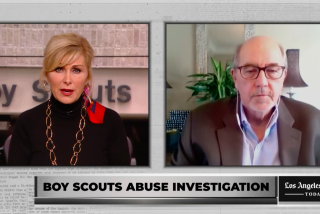Hollywood Reporter Columnist Resigns
George Christy, the controversial, longtime party columnist for the Hollywood Reporter, resigned Wednesday, five months after he was suspended amid allegations of unethical behavior.
Robert J. Dowling, editor in chief and publisher of the Reporter, and spokesmen for Christy and VNU Business Publications, the Reporter’s parent company, said Christy’s separation agreement prohibited them from discussing the terms of his departure.
John Gatti, one of Christy’s attorneys, said Christy’s departure “has nothing to do with any purported allegations against him. It was just time to move on.”
It has been clear for some time that Christy, 74, was on his way out of the Reporter. Last week, before terms were settled, Dowling said, “All the controversy surrounding George detracted from the really fine work our deep staff of professional journalists do every day.”
Christy’s column, “The Great Life,” was a prominent and popular fixture in the trade paper for 26 years, Dowling said Wednesday. “We wish him well in his future endeavors.”
Christy was suspended May 25, almost a month after the editor, executive film editor and labor reporter for the Hollywood Reporter all quit in the aftermath of Dowling’s decision to not publish a story on Christy’s questionable activities.
The story, by labor reporter David Robb, said the Screen Actors Guild-Producers Pension & Health Plans was conducting an “audit inspection” into allegations that Christy was part of a scheme to improperly qualify for benefits as a performer in films in which he did not actually appear.
A federal grand jury investigation was subsequently launched. It is still in progress, as is the SAG inquiry.
Robb’s story also said Christy was writing his columns in rent-free office space he was given by one of the film production companies whose movies are involved in the SAG inquiry.
The inquiry marked the third time Christy’s eligibility for benefits had been questioned by SAG. A 1993 lawsuit was quietly settled, and a 1998 investigation resulted in disallowing a $5,000 credit to his pension and health fund account, Robb said.
Christy has had small roles in more than a dozen movies throughout the years, and the question in all of those inquiries was whether he actually acted in enough of them to qualify for SAG benefits.
Christy was controversial long before the most recent SAG inquiry. Some studio executives and fellow employees have accused him of boorish, bullying behavior and unethical practices.
They say he solicited many costly gifts, ate free in restaurants, stayed free in hotels and wrote favorably of those establishments that picked up his tab.
They also say that, until Dowling told him to desist, Christy routinely insisted that anyone who wanted his or her photo in his column had to pay for a photographer of Christy’s choice, and any studio that wanted him to cover a premiere had to pay a limousine service of his choice to take him to and from the events.
Christy has had many defenders in Hollywood, including supporters who contend his behavior is justified because he belongs to an older generation of Hollywood journalists, an era when lavish gifts, free meals and all-expense-paid junkets were routine.
Anita Busch said she complained to Dowling about Christy’s behavior shortly after becoming editor of the Hollywood Reporter in early 1999.
Out of those discussions came rulings by Dowling that Christy could no longer ask studios to provide limousine service and that the Reporter would pay photographers for the photos taken for Christy’s column.
Busch said Wednesday that, if all her concerns had been “handled .... properly” at the time, the paper would not have lost “three dedicated journalists” and suffered a blow to its own reputation.
Later, when Robb pursued the story on the SAG inquiry and the office space, Dowling decided it was a personnel matter best handled by the company’s human resources department. He refused to run Robb’s story and publicly challenged Robb’s journalistic integrity. Robb, Busch and Beth Laski, her executive film editor, all quit.
Dowling had the story reassigned to other reporters, and the paper published their story, albeit shorter and less prominently than Busch had wanted.
Dowling said the paper would continue to cover the Hollywood social scene, largely in its new “Our Town” feature.
Howard Bragman, a spokesman for Christy, said his client would continue working as a columnist for the Nob Hill Gazette in San Francisco and as a commentator on the Canadian television network.
More to Read
The biggest entertainment stories
Get our big stories about Hollywood, film, television, music, arts, culture and more right in your inbox as soon as they publish.
You may occasionally receive promotional content from the Los Angeles Times.










